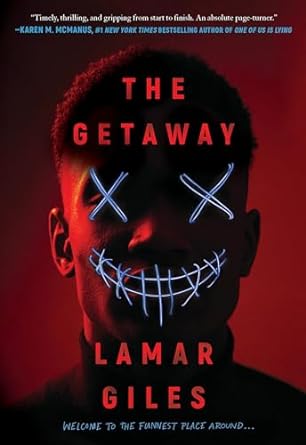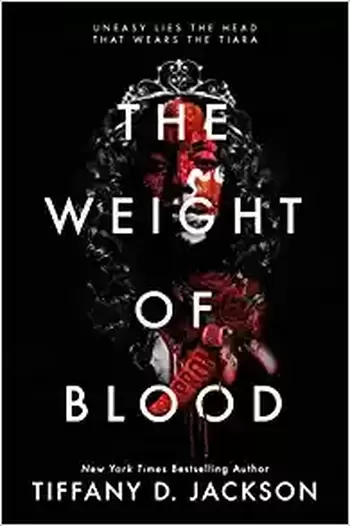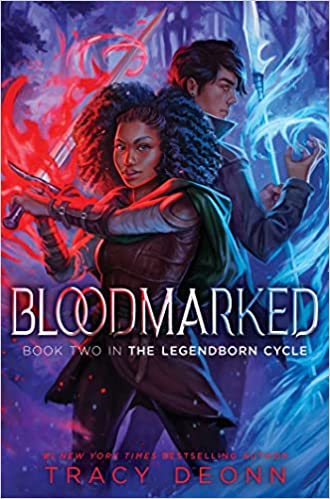| Sarah M. Fleming is a 20-year high school English teacher, president of the Central New York Reading Council and co-founder of the CNY Social Justice League. Her research focuses on critical inquiry instructional methods for implementing anti racist / anti bias pedagogy, specifically as it relates to disrupting the ELA curriculum with young adult literature. |
Scholar Ebony Thomas explains that “when people of color seek passageways into the fantastic, [they] have often discovered that the doors are barred” (2019), speaking to the lack of representation in speculative fiction. We have to do more than simply diversify our book collections and curriculum to do the real kind of anti-oppression and anti-racist work needed in our ELA classrooms. Ebarvia (2021) reminds us of self-work teachers and students must engage with in order to do this work, noting that “we must hold space for students to understand and analyze how those systems of oppression work in their own lives” (p. 582). Sinclair (2018) addresses the call to confront systems of oppression and the symptoms of colonization in the ELA classroom. She claims that “literature can help us and our students identify and understand the systems at work in our society… and once we can see them - and see their impact on others - we can confront and dismantle them” (p. 91-92). In his model for Critical Race English Education, Lamar Johnson (2021) advocates for a pedagogy that “explicitly addresses issues of violence, race, whiteness, white supremacy, and anti-black racism within school and out-of-school spaces” (p. 57). And S. R. Toliver (2020) shows us how speculative fiction can be used to serve as testimony and counter storytelling:
Black authors often assume the role of conjuror, using literary and linguistic magic to challenge oppressors and mitigate the everyday violence enacted on Black communities by those who continuously work to fortify our oppression. To invoke an image of justice, some authors transform the real into the fantastic, grounding their stories in the imaginary because justice has not historically been, nor is it currently, defined as our social reality. In this way, some Black authors embed their truths in the make-believe, combining testimony, and counterstory in hopes that readers will bear witness and join the fight for justice.
We must invite our students to join that fight for justice, and we can do so by embedding texts into our curriculum and classroom libraries that center Black voices, experiences, and perspectives as they exist in speculative fiction. What follows is a brief overview of three recent speculative fiction publications: The Getaway (2022) by Lamar Giles, The Weight of Blood (2022) by Tiffany D. Jackson, and Bloodmarked (2022), sequel to Legendborn (2020) by Tracy Deonn. In each case, I suggest that the centering of these texts can prompt the beginning of the work prompted by these scholars in developing a racial literacy and working toward racial justice. But be forewarned of spoilers! While I leave the resolutions unaddressed, there are specific details discussed below that give away plot lines you may wish to avoid knowing about before reading…

Jay works as an Immediacy Helper (janitor) at Karloff Country, a Disney World-esque entertainment resort in a near-future America suffering the effects of climate change and subsequent famine. Jay’s family and friends live in Jubilee, the predominantly Black employee’s neighborhood, and they all work across the resort for the mostly white, affluent guests to keep them happy - with service and joy, as is “the Karloff way.” But something has happened in the world outside the Karloff walls; first Jay’s friend Connie and her family all disappear overnight without explanation, then private jets start arriving, and suddenly everyone gets confined to their living quarters while the world erupts in a chaotic, apocalyptic event. When the smoke clears, Jay and his friends are directed to return to work because there are apparently still a small handful of elite guests at the resort who expect things to run as normal. At a celebration event that first night after, it becomes clear to Jay and all the other Helpers that they are now at the mercy of these guests, the Trustees, as the Karloff director explains that “for the duration of the world’s metamorphosis, you will live, as promised, with the award-winning, five star service and joy you’ve come to expect within our walls” (p. 163) - and that such service will be provided to them by Jay and the Karloff employees. An all-too familiar hierarchy of race and class is quickly established, and when that precarious balance is challenged by the Helpers, a horrific and violent consequence is the result.
What ensues is a hellish new reality in which these Trustees have direct control over the Karloff employees by way of threatening harm to them through technological control, because “they invested in service. The same service they'd have gotten if the world wasn’t burning. Anticipating some resistance, they created safeguards…” (p. 170). Jay first witnesses and then suffers the result of such safeguards, and readers watch a new social environment unfold that smacks of the emboldened white supremacy and history of enslavement we fear can still be part of our reality.

This book is a must-read for fans of Stephen King, and of Carrie in particular. In this case, the prom nightmare takes place in 2014 in a small, southern town, where segregated proms are still a thing and white supremacy remains unchecked. The main character Maddy is bullied for multiple reasons, but most notably for the recent revelation that she has been passing as white since coming to school in the 7th grade. The story line mirrors its predecessor in that the seemingly well-meaning Wendy is looking to absolve herself of guilt and therefore works to set Maddy up as her boyfriend Kenny’s date to the prom. Kenny, the senior, Black football star, carefully navigates what it means to be the tokenized Black friend amongst his peers, while his white girlfriend Wendy and her circle of friends engage in regular microaggressions. After an incident in terrorizing Maddy went viral on social media, prom chair Wendy decides to work toward a unified prom to combat the spotlight put on their school - but the student body’s response is mixed and some students refuse to participate in the “all-together” prom. As students vote to either keep the proms separate or unify them, teacher Mrs. Morgan explains that “combining proms is a start toward restorative justice, community healing, and unity against an archaic practice,” (p. 91). Kenny’s friend Jason bemoans her statement, claiming that prom’s “not supposed to be about all that. Prom’s about tradition!” and what ensues is an important conversion about tradition being rooted in segregation and systemic racism.
Meanwhile, socially powerless Maddy discovers that she is now manifesting new supernatural powers that let her move objects with her mind. Maddy works to hone her powers, just as she and Kenny become friends in the days leading up to the prom. Interspersed throughout the narrative are excerpts from various media outlets: news stories and a podcast that relate the larger tale to the readers. And while readers watch Maddy grow in her powers, they also get a hint at what is to come on prom night (which I won’t spoil for you), where another terror will befall Maddy - and this time, the entire town will pay for their mistreatment of her as Maddy uses her powers in response. In discussing the final events of that fateful night, one podcast interviewee alludes to the role societal racism played in the disaster, noting that Maddy was “an innocent bystander in a long overdue comeuppance for a town holding on to outdated ideologies” (p. 402). The Weight of Blood becomes more than just a horror story, but one that suggests that if such supernatural responses to systemic racism were possible, “if revenge of this magnitude was even a remote possibility, there would be far less incidents of racial injustice in the world” (p. 404).

Bloodmarked is the sequel to Tracy Deonn’s novel Legendborn, the story of Bree Matthews. While attending the Early College program at UNC-Chapel Hill, 16-year old Bree first witnesses and then becomes party to magical happenings on campus. Bree discovers she is somehow connected to two magical family lines: that of the fabled King Arthur, and her Wildcrafter ancestors with Root magic. She is drawn into the battle of the Legendborn, who fight as the descendants of the Round Table to protect the world and humankind from monsters of the Shadowborn. In this fight she is Called to be the Scion of King Arthur, destined to lead the Legendborn in the ultimate battle of Camlann. But as she rises to her Arthurian fate, she must also reconcile the manifestations of her Root magic, born out of a history of oppression and enslavement. In Bloodmarked, readers are introduced to a greater understanding of this part of Bree's family history, and how she must work to reconcile her identity as a young Black woman while called to be the heir to King Arthur’s bloodline. When others balk at her legacy as being legitimate, she calls them on it and reminds them that the one who pulls the sword becomes king (which she did) - “unless she looks like me” and saying “when white people say something's not about race, it’s usually because it is and they don’t want to talk about it” (p. 168). Later when Bree and her friends stop at a store in rural Georgia, she immediately understands why the restroom is suddenly “out of order” when she goes to use it: “just a reminder that it doesn't matter what my title is, whose magic I have…” (p. 299). And while she leaves the statement unfinished, the implication is clear to the reader - that no matter how much magical power Bree might have, she must still contend with the racist implications of being Black in spaces characterized by white supremacy.
Later Bree meets Valec at the Crossroads Lounge who warns her to be wary of the promises made to her by the Legendborn Order, reminding her that she is “a daughter of the enslaved” (p. 339). As Bree and her friends elude those in the Order who would wish to stifle her power, they make the acquaintance of other rootcrafters who shelter them at Volition, a former southern plantation and home to the Ancestors. Lu explains that “Volition is both a gravesite and a refuge. A site of mourning and a site of hope” (p. 437). Bree finds refuge at Volition and seeks clarity from those generations of women who came before her, as she prepares to do battle with the one who hunts her.
In all three texts, readers are asked to contend with characters, settings and storylines that replicate the harsh realities of a social system imbued with facets of white supremacy and elements of anti-Black racism. Black readers and readers of color will recognize themselves and their experiences in the texts, and white readers will be made to better understand and empathize with situations they can only imagine. As stories of speculative fiction, each asks what if? and wonders what could be, if only people were socially and politically empowered they way they might be fantastically, magically so. In prompting readers to question the status quo, the inclusion of such stories in our classrooms aids students in answering the call to fight for justice, and I for one am grateful to these authors for their work.
References
Deonn, T. (20202). Legendborn. Simon & Schuster.
Deonn, T. (2022). Bloodmarked. Simon & Schuster.
Ebarvia, T. (2021). Starting with self: Identity work and anti-racist literacy practices. Journal of Adolescent & Adult Literacy, 64(5), pp. 581-584.
Giles, L. (2022). The getaway. Scholastic.
Jackson, T. D. (2022). The weight of blood. HarperCollins.
Johnson, L. L. (2021). Critical race English education: New visions, new possibilities. Routledge.
Oziewicz, M. (2017). “Speculative Fiction.” Oxford Research Encyclopedias. https://doi.org/10.1093/acrefore/9780190201098.013.78
Sinclair, M. N. (2018). “Decolonizing ELA: Confronting privilege and oppression in textual spaces.” English Journal, 107(6), pp. 89-94.
Thomas, E. E. (2019). The dark fantastic: Race and the imagination from Harry Potter to the Hunger Games. New York University Press.


 RSS Feed
RSS Feed